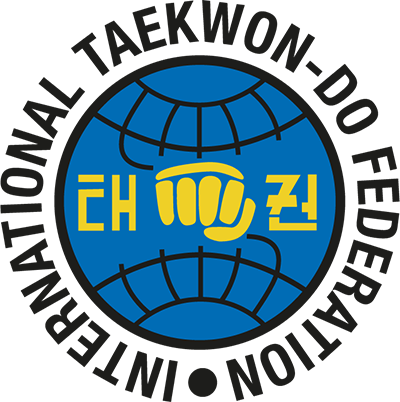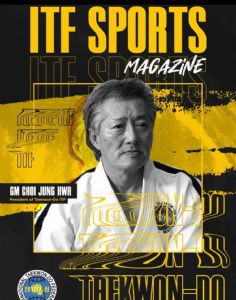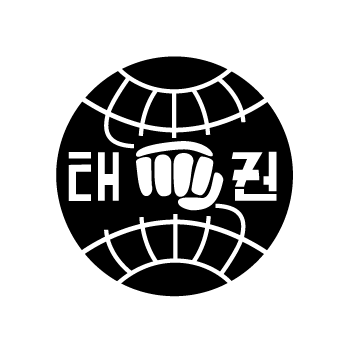| The Unit, Victoria Lane Harlington, Middlesex UB3 5EW United Kingdom |
|

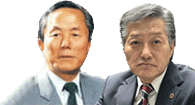
Instructor Certified?
Instructor / Examiner
In addition to a 4th degree or above cert, Instructors must have passed an IIC to grade students and apply for ITF Certification.
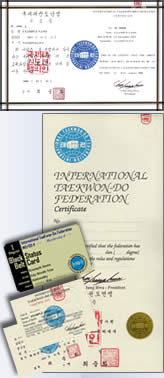
If your unsure please ask to see the Instructor's qualifications. Any reputable ITF Instructor is proud to display the above.
Organisation Certified?
ITF Clubs
If your organisation is in good standing with the ITF they will be listed on our web and have one or both of the following on display:
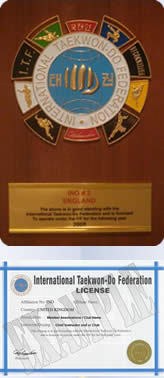
If your unsure please ask to see the Instructor's and Club's qualifications. Any reputable ITF Clubs or Instructors are proud to display the above.
Disciplinary Regulations
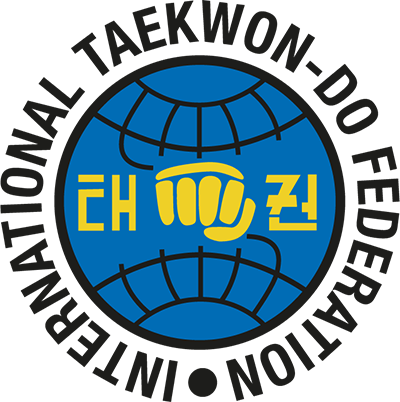
Contents
1. Introduction
2. Why have Disciplinary Rules and Procedures .
3. Delegation
4. Complaints
5. Grounds for Disciplinary Action
6. Disciplinary Actions
7. Notice of Appeal
1. Introduction
These regulations are necessary for the discipline of all International Tae Kwon Do Federation (I.T.F.) members in accordance with the I.T.F. constitution adopted at the XIV Congress on the 8 th November 2002 .
2. Why have Disciplinary Rules and Procedures
Disciplinary rules and procedures will help to promote the I.T.F. Code of conduct in an orderly and fair way in accordance with teachings of our founder General Choi Hong Hi.
Where possible, the disciplinary committee of the I.T.F. will encourage local groups or individuals to reach agreement at local level. It would be an advantage to everyone concerned if the committee can help to mediate at the earliest signs of grievance between parties.
Disciplinary procedures should not be seen mainly as a means of imposing sanctions. Rules and procedures only reinforce our belief and understanding of what is expected of us all.
3. Delegation
The powers of the Federation under article 21 are delegated to the disciplinary committee of the I.T.F.
4. Complaints
- Any INO, NAO, ISD or affiliated member may make a complaint in writing or by e-mail to the Secretary General or the Chairman of the disciplinary Committee, concerning the conduct of another member.
- When a complaint is made the Disciplinary Committee will consider and where appropriate investigate all complaints, provided it is made within a reasonable period of time when the matter arose.
- The Disciplinary Committee can itself investigate any matter concerning the conduct of a member which it considers to have broken any regulations of the I.T.F.
- During its investigation the Disciplinary Committee will keep the President, the complainant, and the accused informed of its progress.
5. Grounds for Disciplinary Action
Disciplinary actions can be taken if a member is deemed guilty of unprofessional conduct.
- Being guilty of any act or conduct which in the opinion of the disciplinary committee appointed by the council of the I.T.F. may discredit the I.T.F. or its members.
- Being accused by a body appointed by the I.T.F. to be in breech of any rules of the I.T.F.
- Failing to assist the committee without good reason during its investigation of an alleged offence.
- Being found guilty of prescribing, selling or taking any illegal substances.
- Discriminating against any individual or groups, on the grounds of gender, race, disability, age, sexual orientation or religion.
- Being investigated or found guilty within National territory of an offence that may discredit the I.T.F. i.e. physical neglect, emotional abuse, sexual abuse or bullying.
- Deliberately accessing pornographic, offensive or obscene material.
- Misuse of the I.T.F. property or Name.
- Causing or teaching physical violence, bullying either verbally or by any other means.
6. Disciplinary Actions
- Any one or more of the following causes of action may be recommended by the disciplinary committee under article 21 (arbitrational) of the I.T.F. constitution.
Having regard to the nature and seriousness of the unprofessional conduct, recommend to the I.T.F. one or more of the following:- A warning is given.
- A reprimand is given.
- Member is demoted.
- The member is suspended.
- The member is expelled.
- The disciplinary committee may determine that no action be taken, and will inform all parties of its findings.
- Where a member is suspended from the I.T.F. he or she will continue to hold membership. In these circumstances one or more of the following may be recommended:
- Extra time added to future waiting time for promotion.
- Loss of title/office
- No I.T.F. support of official functions i.e. seminars, championships and gradings.
- Expulsion of any individual does not mean other members of the same group are also affected. The committee will seek to assure others of a bright future in the I.T.F.
7. Notice of Appeal
Notice of appeal must set out the reasons the decision is being appealed. The member or members appeal must reach the Secretary General and the Chair of the Disciplinary Committee within 5 days of the decision.
On receipt of a recommendation from the Disciplinary Committee, the appeal tribunal of the I.T.F. will convene within seven (7) days of the receipt of an appeal, As referred to in article XXI of the I.T.F. constitution

 Log In
Log In